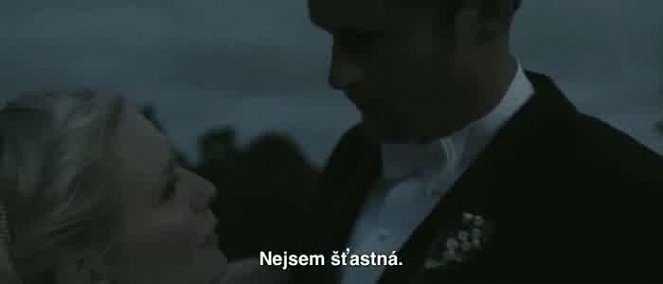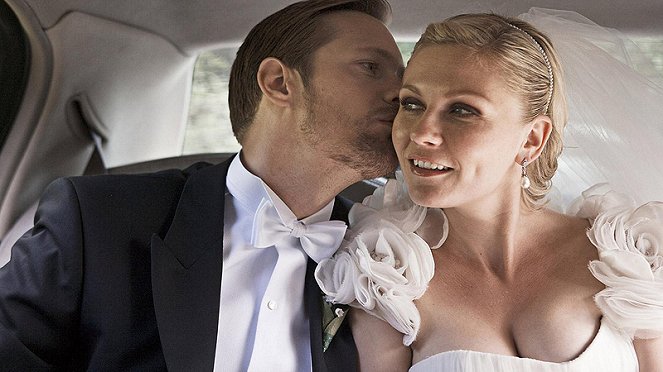Directed by:
Lars von TrierScreenplay:
Lars von TrierCinematography:
Manuel Alberto ClaroCast:
Kirsten Dunst, Charlotte Gainsbourg, Kiefer Sutherland, Charlotte Rampling, Udo Kier, Alexander Skarsgård, Stellan Skarsgård, John Hurt, Jesper Christensen (more)VOD (1)
Plots(1)
From acclaimed director Lars von Trier comes the most stunning and compelling film of the year. Winner of the European Film Award for Best Film and the Cannes Film Festival Award for Best Actress (Kirsten Dunst), Melancholia is a beautiful film about the end of the world. Justine (Kirsten Dunst) and Michael (Alexander Skarsgård) are celebrating their marriage at a sumptuous party in the home of her sister Claire (Charlotte Gainsbourg), and brother-in-law John (Kiefer Sutherland). Despite Claire’s best efforts, the wedding is a fiasco, with family tensions mounting and relationships fraying. And as Claire tries to maintain the party's celebratory spirit, Justine struggles against her own dark demons. Meanwhile, a planet called Melancholia is heading directly towards Earth. (Madman Entertainment)
(more)Videos (2)
Reviews (9)
It's not nearly as layered and symbolically connected and confusing as Antichrist. Actually, it's pretty unbalanced. The first part (Justine) is a classic raw probe into the "ceremony", in which, under the pleasing façade of luxury, hides the mud of pathological relationships and the utter emptiness of modern times (the scene in which the heroine frenetically changes the opened reproductions of modernist paintings behind the canvases of Breughel and Caravaggio, the episode with the advertising agency and the ideal slogan). The inspiration for Vinterberg and Lars' roots in Dogma 95 is more than obvious here. The whole thing is drawn to the unforeseen treacherous and dark Kirsten Dunst, who seems to be an earthly reflection of the approaching planet Melancholia - attractive, destructive, unpredictable. The second part, named after Justine's "settled" sister Claire, is a strangely monotonous wait for disaster, with Trier shifting perspective somewhat from the inside of the characters to the sky from which doom approaches. Some of the dialogues, even with hindsight, feel stretched and a little empty, but the overall vibration is powerful, with the ending being the most powerful. The strange static and passivity of the characters is actually exciting when compared to the obsessive "worldly fixers" of American movies. Justine's condemnation hovers over Melancholia like a memento: Life on Earth is evil. There's no point in looking for philosophy and message in that. Trier focused on the characters and the massively gradating wave of feeling that flounders between heaven and earth, laughter and sadness, love and hatred. Melancholia really left me with a deep melancholy. There's no point in asking why. Melancholy doesn't have a clear origin. It's like the planet. It just emerges behind the sun one day and then crashes mercilessly. It doesn't really matter how many rational complaints you can make about von Trier's new film. It is above all a pure and beautiful fetish. If you're from the same blue-green planet as Lars, of course.
()
My first meeting with Lars von Trier went very well. After the breathtaking introduction I was sorry I didn't catch Melancholia in the movie theatre. After the first part I was delighted and after the following part I was slightly confused but still extremely satisfied. The combination of handheld "earth" camera, "space" views (of which there are not many), music (Wagner!) and perfect acting performances (with the unbeatable Kiefer Sutherland in the lead) was a success. I probably didn't understand everything, but that's why I'll gladly watch the film again in the future.
()
In a way, what is typical of most of Lars' films (namely the huge emotional tension and very powerful intensity of the whole work), Melancholia lacks. I write "in a way" because Melancholia richly compensates for this deficit with its tight, masterfully evoked atmosphere, which especially in the final half escalates to the highest heights in its melancholy. Formally, Melancholia follows Antichrist (the extremely slowed down shots and the perfect composition of the image in the opening sequence are once again breathtaking – plus Wagner's biting melody gives it all the right drive:)) The thing I probably appreciate the most about the entire film is the fact that I was interested the entire time in seeing how the main characters would turn out, something I can't say about the VAST majority of films with similar themes. So, Lars von Trier is again very original in at least one thing – he chooses a sci-fi movie about the end of the world and uses this "banality" (banality in the sense that this theme has been used countless times in movies and the message of similar movies is usually very similar, if not the same) to depict warped family relationships in a very evocative way, and again he lets the viewer watch the despair and melancholy spill over from one character to another throughout the film. While it didn't feel as "gut-wrenching" at the end as Breaking the Waves, Dancer in the Dark, or Dogville, that didn't change the fact that I couldn't get the film out of my head for a few days).
()
This is one destruction of the planet that I actually want to see as a movie. And it’s just as powerful as I had imagined. The human perspective gives the circumstances a certain authenticity and the limited cast in the second half also makes the atmosphere suitably intimate. At the same time, the first “wedding" part comes across like a sarcastic view of various character faults, but maybe it was simply meant to make us feel better, that nobody is perfect and maybe that everybody gets what he/she deserves. Excellent casting, with a weird, but utterly perfectly unstuck Kirsten Dunst and a perfect Kiefer Sutherland who gives a great performance of the only normal (or at least the only character I could identify with) character and spends his time drawing any attention to himself, but as soon as Melancholia comes along, it sweep them all from the surface of the Earth. Amazing escalation. The earth is evil.
()
The first, not very exciting (worthy of three-stars) half is excellently acted, with a nice variety of international stars in supporting roles. However, it doesn’t bring anything more to the table than any conversation scene from any of Trier’s (or Ozon’s) other films. The second (four-stars), more oppressive, more impressive, visually beautiful half of the film, which is also more interesting in terms of the script, intensifies the experience, resulting in the audience being dazzled by the artistic audiovisuals but perplexed and unfulfilled by the content. It’s as if Trier was just experimenting, trying to materialize a feeling, an idea from a short verse. For some, it may be an interesting and clever meditation (after all, it is an extremely elegant game with pictures, music and characters), but for me Melancholia remains only a handful of positive impressions rapidly fading away after the end credits.
()



Ads